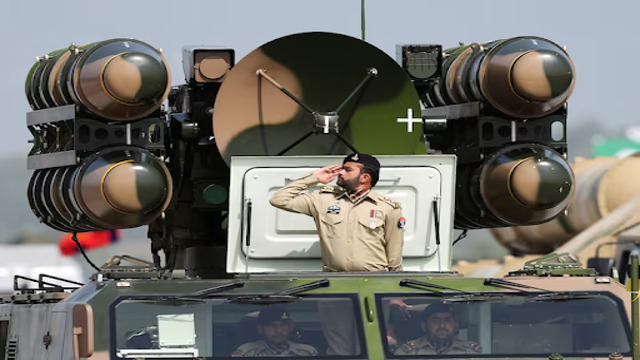
A Pakistani Army soldier stands in salute beside an air defense missile system during the Pakistan Day military parade in Islamabad on March 23, 2022. Reuters
A senior U.S. official has raised significant concerns about Pakistan’s advancements in long-range ballistic missile technology. Speaking at an event on Thursday, Deputy National Security Adviser Jon Finer revealed that Pakistan is developing missile capabilities that could strike targets well beyond South Asia, including the United States, labeling the development as an “emerging threat.”
Finer highlighted that Pakistan’s pursuit of advanced missile technology, including larger rocket motors and long-range systems, is a significant shift from its historical focus on countering India. This revelation reflects the deteriorating relationship between the U.S. and Pakistan, particularly since the American withdrawal from Afghanistan in 2021.
“If these trends continue, Pakistan will possess the ability to target areas far beyond its region, including the U.S. homeland,” Finer stated. He pointed out that very few nuclear-armed nations, such as Russia, China, and North Korea, have similar capabilities. “Candidly, it’s hard for us to see Pakistan’s actions as anything other than an emerging threat,” he added.
The U.S. government’s concerns about Pakistan’s missile program aren’t new. For years, officials have expressed unease over the increasing size and power of Pakistan’s rocket engines. However, Finer’s remarks are seen as unusually direct, signaling heightened alarm over the program's trajectory.
Following Finer’s speech, Washington imposed new sanctions targeting Pakistan’s ballistic missile development program. For the first time, the state-run defense agency overseeing the program was included in these measures. Despite repeated U.S. efforts to address the issue, Pakistani officials have consistently dismissed American concerns as biased, according to senior U.S. sources.
“Pakistani officials claim our sanctions aim to limit their ability to defend against India, but that’s not the case. They continue to ignore our warnings and refuse to engage in meaningful dialogue,” said one U.S. official.
Pakistan has long justified its nuclear weapons and missile programs as necessary for deterring aggression from India, a rival with which it has fought three major wars since their independence in 1947. Pakistan also views these programs as vital for maintaining regional stability.
The deteriorating relationship between the U.S. and Pakistan comes amidst warming ties between Washington and India, as well as Pakistan’s growing alliance with China. Several Chinese entities have faced U.S. sanctions for allegedly aiding Pakistan’s missile program.
Pakistan first tested nuclear weapons in 1998, following similar moves by India. Since then, it has expanded its arsenal to an estimated 170 warheads, according to research. Its ballistic missile capabilities, paired with nuclear warheads, make it a significant power in the region.
Finer’s remarks are viewed as a dramatic shift in U.S. rhetoric. Experts believe the statement could have far-reaching implications for U.S.-Pakistan relations. “For a senior official to publicly link Pakistan’s missile advancements to a direct threat to the U.S. homeland is a major development,” noted an international security analyst.
While the threat may be a decade away, as one official suggested, the U.S. is making it clear that it expects Pakistan to reconsider its actions. The strained ties between the two countries reflect years of fluctuating cooperation and conflict, from Cold War alliances to disagreements over Pakistan’s internal and foreign policies.















